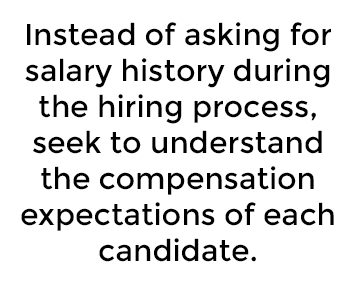


Earlier this year, New Jersey passed the Diane B. Allen Equal Pay Act, bolstering protections against employment discrimination for protected classes.[2] As of January 1, 2018, employers in California can no longer ask job candidates about their salary history—an effort to ensure wage discrimination does not follow people from position to position.[3]
Campbell & Company strongly supports the spirit of these policies. At the same time, we understand that nonprofit organizations need guidance when navigating this evolving landscape. We believe that legislation similar to the California salary history ban will continue to gain momentum nationwide.
For these reasons, our Executive Search team recommends that nonprofits adopt a proactive policy. Instead of asking for salary history during the hiring process, seek to understand the compensation expectations of each candidate.
Read on for six recommendations to help you implement this policy:
 Conduct compensation analysis early in the search process and base salary range on the market if possible. Industry societies and associations (such as AFP in the fundraising space) often conduct compensation surveys, and sites like Guidestar and Glassdoor can provide insight into market salary range.
Conduct compensation analysis early in the search process and base salary range on the market if possible. Industry societies and associations (such as AFP in the fundraising space) often conduct compensation surveys, and sites like Guidestar and Glassdoor can provide insight into market salary range.
Executive search firms are also able to add value in this area; our practice regularly conducts compensation analyses for clients.
The coming months will, no doubt, bring new compensation bills. Now is the best time to begin adopting solutions that are progressive, timely, and reasonable—both for your organization and for your employees.
If you have questions, feel free to leave a comment below or contact me directly at dan.nevez@campbellcompany.com.
[1] https://www.littler.com/publication-press/publication/youre-gonna-need-bigger-boat-pay-equity-initiatives-flood-state
[2] https://www.csemploymentblog.com/2018/04/articles/employment-policies-and-practi/nj-passes-diane-b-allen-equal-pay-act/
[3] https://www.shrm.org/resourcesandtools/legal-and-compliance/state-and-local-updates/pages/california-salary-history-ban-questions.aspx